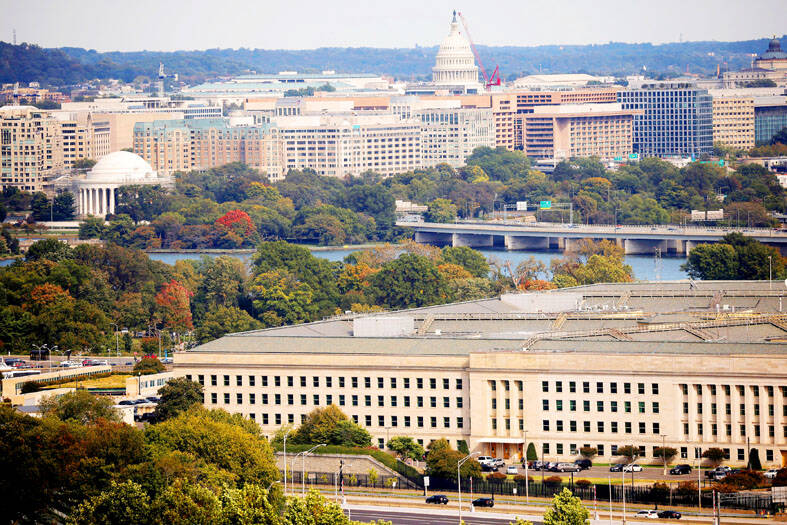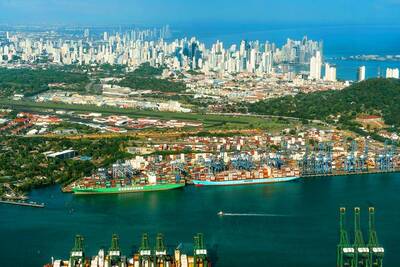A Pentagon unit tasked with facilitating the US military’s adoption of new technology is soon to deploy officials to dozens of friendly nations, including Taiwan, the Financial Times reported yesterday.
The US Department of Defense’s Defense Innovation Unit (DIU) is to send a representative to collaborate with Taiwan on drones and military applications from the semiconductor industry by the end of the year, the British daily reported, citing three sources familiar with the matter.
“Drones will certainly be a focus, but they will also be looking at connecting to the broader civilian and dual-use ecosystem, including the tech sector,” one source was quoted as saying.

Photo: Reuters
The liaison officer to Taiwan would be stationed at the American Institute in Taiwan, the de facto US embassy in Taiwan, the other two sources told the newspaper.
Another priority is to send a DIU official to Japan, they said.
DIU Director Doug Beck abruptly resigned on Monday, but his departure is not expected to affect the liaison program, the Pentagon told the newspaper.
The defense department would “continue to ensure the successful transition of proven DIU initiatives that support the secretary of defense’s priorities,” it quoted a US defense official as saying.
Speaking on condition of anonymity, officials at two US allies said the DIU’s progress in forging links with foreign industries would be a test of US President Donald Trump’s commitment to cooperative relationships.
“Much of the rhetoric we have heard from Trump officials has been demands for more money or suggestions that we can’t be trusted,” the paper quoted an Asian national security official as saying.
“Putting someone here who values our technology, it will be a recognition that we can only achieve these things together,” they added.
“We intend to place liaisons with allies and partners across the Indo-Pacific, Europe and the Middle East as quickly as personnel become available,” a DIU spokesperson told the Financial Times.
“Exchanging liaisons with like innovation organizations is an important component of the DIU’s international line of effort, as it allows [the US] to seize collaboration opportunities early,” it quoted them as saying.
The DIU’s plan came as China continues making strides in developing new arms, including spacecraft, warships and missile systems, while endemic capacity woes plague the US defense industrial base, the newspaper said.
Beijing in 2021 surprised the Pentagon by testing a maneuvering hypersonic spacecraft that fired a missile mid-flight, with the then-chair of the US Joint Chiefs of Staff comparing the incident to a “Sputnik moment,” it said.
In 2023, Washington directed the DIU to focus on technologies most critical to the US armed forces’ ability to defeat a peer-level adversary in a conflict, including drones, the newspaper said.

LIMITS: While China increases military pressure on Taiwan and expands its use of cognitive warfare, it is unwilling to target tech supply chains, the report said US and Taiwan military officials have warned that the Chinese People’s Liberation Army (PLA) could implement a blockade within “a matter of hours” and need only “minimal conversion time” prior to an attack on Taiwan, a report released on Tuesday by the US Senate’s China Economic and Security Review Commission said. “While there is no indication that China is planning an imminent attack, the United States and its allies and partners can no longer assume that a Taiwan contingency is a distant possibility for which they would have ample time to prepare,” it said. The commission made the comments in its annual

DETERMINATION: Beijing’s actions toward Tokyo have drawn international attention, but would likely bolster regional coordination and defense networks, the report said Japanese Prime Minister Sanae Takaichi’s administration is likely to prioritize security reforms and deterrence in the face of recent “hybrid” threats from China, the National Security Bureau (NSB) said. The bureau made the assessment in a written report to the Legislative Yuan ahead of an oral report and questions-and-answers session at the legislature’s Foreign Affairs and National Defense Committee tomorrow. The key points of Japan’s security reforms would be to reinforce security cooperation with the US, including enhancing defense deployment in the first island chain, pushing forward the integrated command and operations of the Japan Self-Defense Forces and US Forces Japan, as

IN THE NATIONAL INTEREST: Deputy Minister of Foreign Affairs Francois Wu said the strengthening of military facilities would help to maintain security in the Taiwan Strait Japanese Minister of Defense Shinjiro Koizumi, visiting a military base close to Taiwan, said plans to deploy missiles to the post would move forward as tensions smolder between Tokyo and Beijing. “The deployment can help lower the chance of an armed attack on our country,” Koizumi told reporters on Sunday as he wrapped up his first trip to the base on the southern Japanese island of Yonaguni. “The view that it will heighten regional tensions is not accurate.” Former Japanese minister of defense Gen Nakatani in January said that Tokyo wanted to base Type 03 Chu-SAM missiles on Yonaguni, but little progress

IN THE MIDDLE: Some of the lawmakers defended the trip as an opportunity for investment, cooperation and to see models that could help modernize Panama A planned trip by some Panamanian lawmakers to Taiwan has unleashed the latest diplomatic spat with China as the Central American country tries to navigate the turbulent waters between the Asian superpower and the US. The Panamanian Ministry of Foreign Affairs and the US ambassador to the country on Wednesday criticized China’s diplomats in Panama for asking the lawmakers to cancel their trip to Taiwan, with the ministry accusing the Chinese embassy of “meddling” in its internal affairs. That followed comments from Panamanian President Jose Raul Mulino a week earlier saying that the planned Taiwan trip did not have the approval of